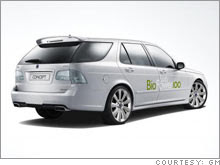Battery-like device could power electric cars - CNN.com, Fri September 7, 2007
Battery-like device could power electric cars - CNN.com: "AUSTIN, Texas (AP) -- Millions of inventions pass quietly through the U.S. patent office each year. Patent No. 7,033,406 did, too, until energy insiders spotted six words in the filing that sounded like a death knell for the internal combustion engine.
An Austin-based startup called EEStor promised 'technologies for replacement of electrochemical batteries,' meaning a motorist could plug in a car for five minutes and drive 500 miles roundtrip between Dallas and Houston without gasoline.
By contrast, some plug-in hybrids on the horizon would require motorists to charge their cars in a wall outlet overnight and promise only 50 miles of gasoline-free commute. And the popular hybrids on the road today still depend heavily on fossil fuels.
'It's a paradigm shift,' said Ian Clifford, chief executive of Toronto-based ZENN Motor Co., which has licensed EEStor's invention. 'The Achilles' heel to the electric car industry has been energy storage. By all rights, this would make internal combustion engines unnecessary.'
Clifford's company bought rights to EEStor's technology in August 2005 and expects EEStor to start shipping the battery replacement later this year for use in ZENN Motor's short-range, low-speed vehicles.
The technology also could help invigorate the renewable-energy sector by providing efficient, lightning-fast storage for solar power, or, on a small scale, a flash-charge for cell phones and laptops.
Skeptics, though, fear the claims stretch the bounds of existing technology to the point of alchemy.
'We've been trying to make this type of thing for 20 years and no one has been able to do it,' said Robert Hebner, director of the University of Texas Center for Electromechanics. 'Depending on who you believe, they're at or beyond the limit of what is possible.'
EEStor's secret ingredient is a material sandwiched between thousands of wafer-thin metal sheets, like a series of foil-and-paper gum wrappers stacked on top of each other. Charged particles stick to the metal sheets and move quickly across EEStor's proprietary material.
The result is an ultracapacitor, a battery-like device that stores and releases energy quickly.
Batteries rely on chemical reactions to store energy but can take hours to charge and release energy. The simplest capacitors found in computers and radios hold less energy but can charge or discharge instantly. Ultracapacitors take the best of both, stacking capacitors to increase capacity while maintaining the speed of simple capacitors.
Hebner said vehicles require bursts of energy to accelerate, a task better suited for capacitors than batteries.
'The idea of getting rid of the batteries and putting in capacitors is to get more power back and get it back faster,' Hebner said.
But he said nothing close to EEStor's claim exists today.
For years, EEStor has tried to fly beneath the radar in the competitive industry for alternative energy, content with a phone-book listing and a handful of cryptic press releases.
Yet the speculation and skepticism have continued, fueled by the company's original assertion of making batteries obsolete -- a claim that still resonates loudly for a company that rarely speaks, including declining an interview with The Associated Press.
The deal with ZENN Motor and a $3 million investment by the venture capital group Kleiner Perkins Caufield & Byers, which made big-payoff early bets on companies like Google Inc. and Amazon.com Inc., hint that EEStor may be on the edge of a breakthrough technology, a 'game changer' as Clifford put it.
ZENN Motor's public reports show that it so far has invested $3.8 million in and has promised another $1.2 million if the ultracapacitor company meets a third-party testing standard and then delivers a product.
Clifford said his company consulted experts and did a 'tremendous amount of due diligence' on EEStor's innovation.
EEStor's founders have a track record. Richard D. Weir and Carl Nelson worked on disk-storage technology at IBM Corp. in the 1990s before forming EEStor in 2001. The two have acquired dozens of patents over two decades.
Neil Dikeman of Jane Capital Partners, an investor in clean technologies, said the nearly $7 million investment in EEStor pales compared with other energy storage endeavors, where investment has averaged $50 million to $100 million.
Yet curiosity is unusually high, Dikeman said, thanks to the investment by a prominent venture capital group and EEStor's secretive nature.
'The EEStor claims are around a process that would be quite revolutionary if they can make it work,' Dikeman said.

Comments